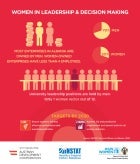Breadcrumb
Stories
Topic
- Show all (1276)
- Leadership and political participation (-) (9)
- Gender wage gap (-) (4)
- Ending violence against women and girls (72)
- Gender equality and women’s empowerment (45)
- Anti-violence interventions (41)
- Gender discrimination (38)
- Gender equality and inequality (38)
- Domestic violence/interpersonal violence (36)
- Access to justice and legal protection (33)
- Legal assistance (29)
- Laws, legislation (26)
- Gender-responsive budgeting (24)
- Primary prevention (24)
- Sexual harassment (24)
- Feminicide/femicide (23)
- Service delivery (23)
- Economic empowerment (22)
- Rape/sexual assault (21)
- Employment (20)
- Shelters (20)
- Rural women (19)
- Entrepreneurship (18)
- Decision-making (16)
- Youth (16)
- Gender power relations (15)
- Women’s rights (15)
- COVID-19 (14)
- Financing for gender equality (13)
- Gender mainstreaming (13)
- Civil society (12)
- Gender, culture and society (12)
- Men and boys (masculinity) (12)
- Political empowerment (12)
- Access to basic services (11)
- Adolescents (11)
- Businesses and foundations (11)
- Girls (11)
- Human rights (11)
- UNiTE campaign (11)
- Beijing Platform for Action (10)
- Civil society participation (10)
- Peace and security (10)
- Safe Cities and Safe Public Spaces (10)
- Training (10)
- Women with disabilities (10)
- Convention on the Elimination of All Forms of Discrimination against Women (CEDAW) (9)
- Financial resources (9)
- Information and communications technology (ICT) (9)
- National planning (9)
- Partnerships (9)
- Gender stereotypes (8)
- Governance (8)
- Innovation and technology (8)
- Institutional mechanisms (8)
- Peacebuilding (8)
- Social protection (8)
- Women farmers (8)
- Citizen engagement (7)
- Gender statistics (7)
- Generation Equality (7)
- Government contributors (7)
- Productive resources (7)
- Religion (7)
- Science and technology for development (7)
- Sports (7)
- Trafficking/sexual exploitation (7)
- Women’s movements (7)
- 2030 Agenda for Sustainable Development (6)
- Child marriage (6)
- Communications and media (6)
- Electoral systems and processes (6)
- Lesbian, gay, bisexual, transgender, intersex (LGBT) rights (6)
- Markets (6)
- Political violence (6)
- Sex-disaggregated data (6)
- Sustainable Development Goals (SDGs) (6)
- Unpaid work (6)
- Accountability (5)
- Gender data production and collection (5)
- Governance and national planning (5)
- Rural development (5)
- Traditional media (5)
- Constitutions and legal reform (4)
- Gender data gaps (4)
- Gender data use and accessibility (4)
- Health (4)
- Intergovernmental processes (4)
- Land and property (4)
- New media (4)
- Poverty (4)
- Public administration (4)
- Rule of law (4)
- Schooling (4)
- Accountability in the UN system (3)
- Climate change (3)
- Crisis response and recovery (3)
- Education (3)
- Environmental protection (3)
- Gender equality indicators (3)
- Health care services (3)
- Inheritance rights (3)
- Living conditions (3)
- Media leadership (3)
- National mechanisms (3)
- National statistical systems (3)
- Parliamentary development (3)
- UN Security Council resolution 1325 (3)
- UN system coordination (3)
- Capacity development (2)
- Coordination, knowledge management (2)
- Disaster risk reduction (2)
- Food security (2)
- Fundamental freedoms (2)
- Fund for Gender Equality (2)
- Harmful practices (2)
- Humanitarian action (2)
- Human rights–based approach (2)
- Macroeconomic policies (2)
- Monitoring and evaluation (2)
- Planning and monitoring (2)
- Sexual and reproductive health and rights (2)
- UN Security Council resolutions (2)
- Urban development (2)
- Åsa Regnér, Deputy Executive Director for Policy, Programme, Civil Society and Intergovernmental Support (1)
- Children’s rights (1)
- Commission on the Status of Women (1)
- Executive Director (1)
- Financial and economic crisis (1)
- Green economy (1)
- Literacy (1)
- Local development (1)
- Maternal health (1)
- Migration (1)
- Monitoring, evaluation and reporting (1)
- Peace processes (1)
- Public sector reform (1)
- Sexuality (1)
- Temporary special measures, affirmative action (1)
- UN Trust Fund to End Violence against Women (1)
Region
Country
1 - 13 of 13 Results
Date:
Over the past decades, women and girls around the world have demolished barriers, dismantled stereotypes and driven progress towards more just and equal societies. Women’s rights were recognised as fundamental and universal human rights.
Date:
The local government elections on 14 May are an important opportunity to strengthen local democracy in Albania, and to consolidate past achievements in promoting women leadership in decision-making. Ahead of the start of the campaign, the United Nations in Albania reached out to political party leaders, advocating for women’s full and meaningful participation in local elections, and presenting a set of recommendations in three key areas.
Date:
Around 20 journalists and media experts joined the media forum on "Media and Violence Against Women in Politics and Elections" organized prior to Albania’s Local Elections taking place on the 14th of May, by UN Women and its partner organization "Together for Life". Participants in the event discussed the various challenges faced by women in politics and elections and the crucial role of the media in addressing them.
Date:
Interview with Michele Ribotta, Head of the UN Gender Group and UN Women Representative in Albania
Date:
On 24 February 2023, the Government of Albania and UN Women hosted a sub-regional consultation for the Western Balkans and Türkiye, in preparation for the 67th session of the Commission on the Status of Women (CSW67). The consultation provided an opportunity to discuss the gender gap in digital access, women's underrepresentation in certain professions, women’s entrepreneurship, decision-making in the digital transformation, as well as online discrimination and violence in the region.
Date:
FED Invest is amongst the latest private companies in Albania signing the Women’s Empowerment Principles (WEPs). FED Invest, a financial services company, joined the group of private sector partners that are now formally promoting gender equality and women’s empowerment in the workplace, marketplace, and community.
Date:
More than ninety women and girls from four regions of Albania participated in a fair event organized by UN Women and supported by the Albanian Network for Rural Development. They discussed the challenges faced by women in the agri-food sector in the presence of representatives from the Ministry of Agriculture and Rural Development, the Italian Agency for Development Cooperation and Municipality of Elbasan officials.
Date:
A joint position paper by United Nations in Albania identifying four key areas and strategies to accelerate gender equality and the empowerment of all women and girls in the country.
Date:
Building back better from COVID-19 needs investment in feminist, grass-roots leadership. Yet, direct funding to women’s organizations accounts for less than one per cent of the global official development assistance provided for gender equality. In six stories, learn about the critical support that grass-roots women leaders and their organizations bring to their communities.
Date:
UN Women is intensifying its preparations for the 2021 Generation Equality Forum amidst a back-drop that shows women’s rights and leadership are under threat, and even more exacerbated due to the COVID-19 pandemic. Current projections show that gender equality in the highest positions of power will not be reached for another 130 years. This year’s International Women’s Day rings the alarm on rising threats to gender equality and highlights the need to build back better for a more gender-equal future.
Date:
“Women and Men in Albania”, the most recent collection of gender statistics in the country was launched by the Albanian Institute of Statistics (INSTAT) and UN Women with financial support of the Austrian Development Agency. The publication provides data regarding population, health, education and decision making, bringing into focus gender equality.
Date:
Albania has reached a new milestone with women’s representation in politics. Following the national elections held on 25 June, the Albanian Parliament will soon welcome a record number of women parliamentarians. The initial results indicate that women’s representation has reached 28 per cent—a marked improvement compared to 2013 elections, when around 18 per cent women were elected.
Date:
UN Women-supported training focuses on integrating a gender perspective and developing policies to increase women's participation as leaders and decision-makers in the Albanian State Police force.
1 - 13 of 13 Results








